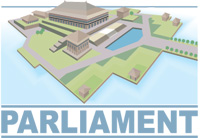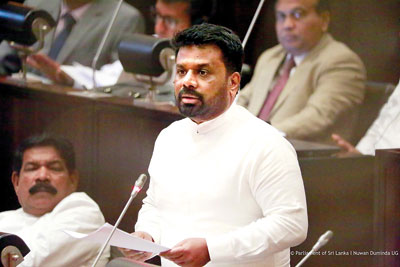Columns
House gets new Speaker; relief for schoolchildren hit by economic crisis under radar
View(s):By Sandun Jayawardana
An eventful final two days of Parliamentary sittings for 2024 saw the election of a new Speaker, the President briefing the House on economic relief the government aims to provide in 2025 and plenty of arguments over academic and professional qualifications of government and opposition MPs.
On Tuesday (17), the House unanimously elected Polonnaruwa District National People’s Power (NPP) MP Dr. Jagath Wickramaratne as the new Speaker following the resignation of Asoka Sapumal Ranwala from the post. Mr Ranwala’s resignation, following days of controversy over the authenticity of his academic qualifications, meant he goes down in Parliament history as the shortest serving Speaker.
Although the main opposition Samagi Jana Balawegaya (SJB) had hinted the previous day that it too intended to field a name from the opposition to the post of Speaker, it backed out from doing so on Tuesday. Dr. Wickramaratne’s name was proposed by Prime Minister Dr. Harini Amarasuriya and seconded by Leader of the House Bimal Ratnayake. Since no other names were proposed, Dr. Wickramaratne was duly elected unopposed as the new Speaker. The PM, Opposition Leader Sajith Premadasa and other party leaders all offered their congratulations to the new Speaker on his election.
The main legislative business of the House this week was a two-day debate held to pass a supplementary sum of Rs. 6.5 billion to provide an allowance for children impacted by the economic crisis to purchase school stationery items.
Opening the debate, Prime Minister Harini Amarasuriya explained that the economic crisis had a significant negative impact on children’s education. According to a household survey conducted by the Department of Census and Statistics, 55% of school-going children have been negatively impacted by the crisis. Rural and plantation sector students are the most impacted. “It has been revealed that 53.2% of impacted children have either minimised purchasing school stationery items or stopped purchasing them altogether. 26.1% are reusing school stationery products,” the PM noted.
Given this situation, the government has decided to provide an allowance for schoolchildren for 2025 to purchase school stationery items. Accordingly, each child between the ages of 5-18 from a family receiving ‘Aswesuma’ benefits will receive an allowance of Rs. 6000 to purchase school stationery items. About 825, 000 children are due to receive this allowance. The government is also planning to provide relief to impacted schoolchildren whose families don’t receive Aswesuma benefits, but who require such an allowance for stationery. Authorities are in the process of collecting information on such children but initial estimates indicate they could number about 250, 000, the Premier revealed. She added the government was also working to strengthen the ongoing school meals programme and thanked the Chinese government for providing the entire requirement of clothing material required to provide uniforms for school students in 2025.
SJB General Secretary Ranjith Madduma Bandara though, pointed out that while there are some 4.1 million children in the country’s school system, the stationery allowance is only being given to about 1 million of them. He urged the government to provide the allowance for all students rather than a select group. Mr Madduma Bandara stressed that the best solution would be to allocate 6% of the country’s GDP for education. 
He also recalled hearing President Anura Kumara Disanayake pledging on the campaign trail that an NPP government would remove the 18% Value Added Tax (VAT) imposed on school books. “But today, you’re keeping an 18% VAT on 4.1 million school students while only providing an allowance to 1 million,” the SJB general secretary said. He further criticised the government’s decision to use the ‘Aswesuma’ programme of former President Ranil Wickremesinghe for determining who gets the school stationery allowance. He alleged Aswesuma has been a massive failure when determining who qualifies for social benefits. “Are you going to use the same measure that Ranil Wickremesinghe used to select who qualifies as poor?” he asked the government.
According to statistics, though nearly 350, 000 children are enrolled in Grade 1 in schools each year, about 50, 000 of them drop out by the time they get to Grade 10, said Minister of Women and Child Affairs Saroja Savithri Paulraj. The number of children dropping out from school has been increasing at an alarming rate in recent years, she added. It is the duty of a government to do everything it can to create an environment enabling children to stay in school, the minister stressed, adding that the stationery allowance is one element in this endeavour. “We as the NPP government have taken on the responsibility of ensuring the universal right to education where no child in this country will be forced to give up their education over the next 5 to 10 years.”
The supplementary sum was passed without a vote. Parliament will reconvene on January 7.
| Will never allow a crisis like in 22-23, says AKD The NPP government will never allow a crisis situation like what befell the country in 2022-23 to reoccur, President Anura Kumara Disanayake assured in Parliament on Wednesday. “We are confident in our goal of increasing Sri Lanka’s foreign exchange reserves to USD 15.1 billion by 2028. This is not just an aspiration; it is a commitment that we are diligently working to fulfill,” the President stressed, as he outlined the government’s economic plans for next year. The President also revealed several measures the government intends to introduce to both bring relief to the people and revive the economy. He announced that the International Monetary Fund (IMF) had agreed during discussions on the third review of its Extended Fund Facility (EFF) to raise the Pay As You Earn (PAYE) tax threshold from Rs. 100, 000 to Rs. 150, 000.
According to figures given by the President, an individual earning a monthly income of Rs. 150,000 will be 100% free from tax. A person earning Rs. 200,000 is exempted from 71% of the tax they would otherwise have paid. A person with a salary of Rs. 250,000 is exempted from 61% of the tax while an individual earning Rs. 300,000 will have 47% of their earnings exempted from tax. A person earning Rs. 350,000 is exempted from 25.5% of the tax. The President pointed out that the government has provided greater relief to lower-income earners while reducing benefits to those earning higher salaries. It was also announced that locally-produced fresh milk and yogurt have been exempted from VAT to improve nutritional standards of children while the export service tax rate, which had been at 30% by the previous government, has been reduced to 15%. The President further revealed that the government will allow the import of vehicles for private use from February 1, 2025. Passenger transport buses and vehicles for special purposes have already been reopened for import as of December 14. Extensive discussions have been held with the Central Bank, and estimates have been prepared regarding the amount of dollars expected to be allocated for these imports. These calculations ensure that the economy can sustain the impact, the President noted. Insisting that the government can’t keep the vehicle market closed for a lengthy period, President Disanayake said that reopening the vehicle market is an essential step to rejuvenate the country’s economy. | |
Buying or selling electronics has never been easier with the help of Hitad.lk! We, at Hitad.lk, hear your needs and endeavour to provide you with the perfect listings of electronics; because we have listings for nearly anything! Search for your favourite electronic items for sale on Hitad.lk today!



Leave a Reply
Post Comment